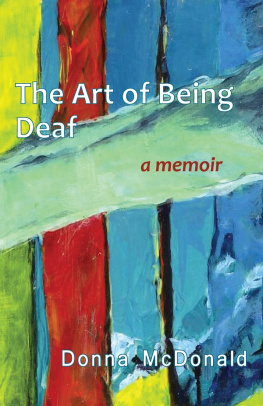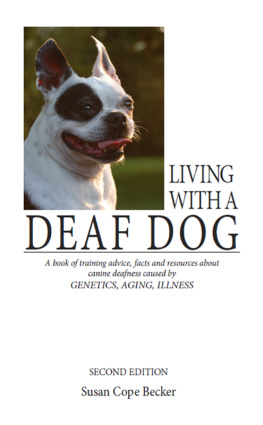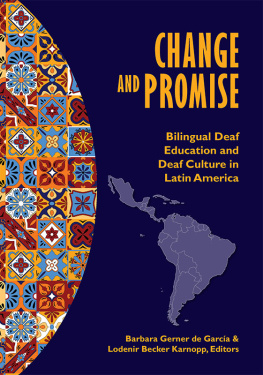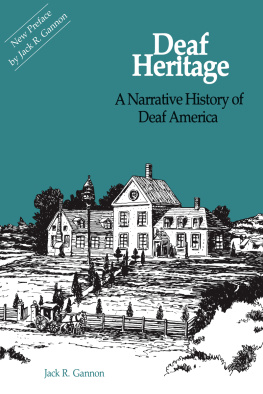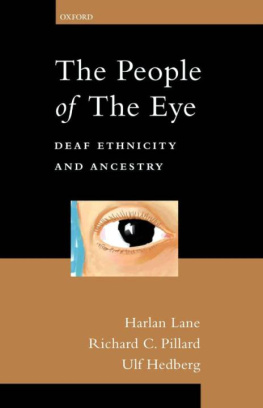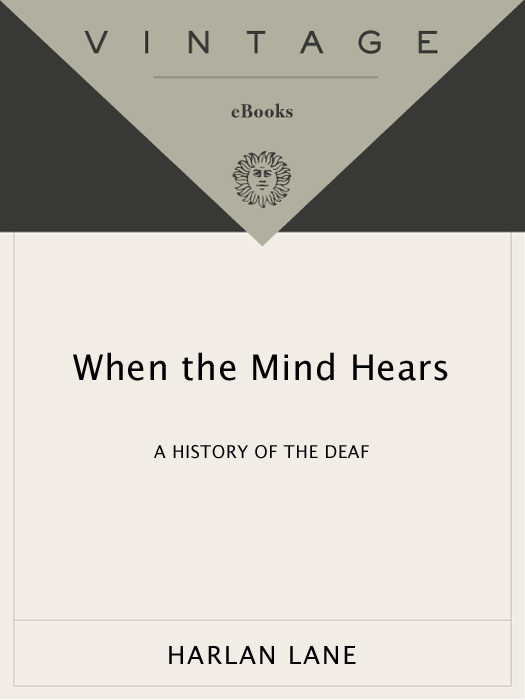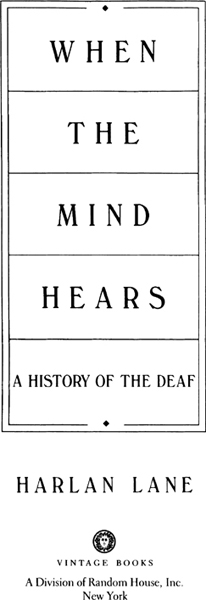FOREWORD
On the face of it, people are quite afraid of human diversity and look to their social institutions to limit or eradicate it. As a psychologist I am interested in learning more about that fear, and as a psychologist of language, more about the role of language policy in catering to it. The history of relations between the society of hearing-speaking people and the community of deaf-signing people is an excellent case study in the motives and means at work when fear of diversity leads majorities to oppress minorities. The attempt to force assimilation, to claim biological insufficiency when assimilation fails, to indoctrinate minority children in majority values through the schoolsall this and much more will be familiar to readers interested in the predicament of other minority communities. In short, When the Mind Hears is a study in the anatomy of prejudice.
The hearing loss of most members of the signing community has proven disastrous for them because it has played into the hands of those who seek to dispose of social problems by medicalizing them. The two million or so men and women who use manual language in the United States are not handicapped in the usual sense; theirs is largely a problem of overcoming language barriers, not a problem of disability. So say my deaf friends, and the evidence bears them out. Then why do we hearing people consider the deaf disabled, defective? Why do we and our institutions class them not with groups such as Spanish-speaking Americans but with groups such as blind Americans? Why indeed?
Using the medical model, our society is irresponsibly tearing many deaf children from the social fabric of the signing community in which their lives are interwoven and casting them willy-nilly into mainstream schools, as if pretending that they spoke would make it so. Some hearing educators reply that proximity is the first step in integration, and integrationmaking others like ourselvesis a self-evident good. When no provision is made in mainstreaming for the language barrier, however, this proximity proves, in the words of a deaf educator, as productive as that between a dog and its fleas. The mainstreaming movement is proceeding with near total disregard of the wishes of the signing community, which has always been at odds with its hearing benefactorsotologists, audiologists, speech pathologists, special educators. As long as this establishment clings to the medical model, it cannot take the next step forward with the signing community, which is to supplant that model.
Thus it has become necessary for a student of language to tell the history of the deaf minority; hearing students of the deaf have been proceeding on the premise that there is no minority and hence no minority history to tell. Until recently, no deaf person had written a history of the deaf community eitherbitter testimony to the effectiveness of the establishment in inculcating the medical model of deafness in deaf children.
I expect there are many people, hearing and deaf, particularly outside the signing community, who will find my interpretation of the record unpalatable. Some reject the view that the signing community is foremost a linguistic minority; others contend that the first priority of minorities, sign-language, spoken-language, or otherwise, should be assimilation. The proper relations between a minority and the society in which it is embedded are generally the subject of heated dispute, and the proper relation between the signing community and hearing society has been the subject of an impassioned debate for over two hundred years. These readers and others with strongly held views at odds with those of this history may be tempted to dismiss the history for its strongly held views, preferring what they would choose to call a more impartial account, a statement of the hard facts.
A history cannot be written, however, without a point of view. Nor even, if that were possible, should it be. A history is bound to be an interpretation because, for one thing, it makes selections at every turn among an infinity of facts. It defines its domain, excluding some periods, nations, individuals, including others. Within the domain, the documentation is incomplete, and of those facts well documented the historian will cite some and not others, according to their significance. That is, the historian has a vantage point and he will arrange and subordinate his selected facts and describe them in a way that allows him to develop his interpretation.
Thus the history of a language community has some things in common with a grammar of that communitys language. Both are theories that attempt to account in insightful ways for a selection of facts, a selection motivated by the nature of the theory itself. There can be many histories of the signing community as there can be many grammars of American Sign Language, and we can choose among them. Theories are, of course, social artifacts, and the same cultural forces that so long delayed the linguistic description of American Sign Language have also delayed the history of the community that uses it. Just as hearing people assumed, and taught the deaf, that the deaf community had no language of its own but at best a manual variant of spoken language, so they assumed, and taught the deaf, that they had no history in their own right but only at best a chapter in hearing history (generally entitled Educating the Deaf).
Even if we could write history as documentation, we should not. If there is truth to Hegels claim that people and governments have never learned anything from history, this should motivate the historian who wants to have an impact on human affairs, as I do, to write in a way that commands general attention. If his subject, moreover, turns on sustained outrages against fundamental human values, as mine does, is he to deny his humanity and pretend indifference?
Since a history, then, must have a point of view and should have a point of view, the reader might like to have mine clearly posted, as follows. With the recent evidence from linguistics that American Sign Language is a natural language, the signing community is revealed to be a linguistic minority, and this history interprets the record of their struggle in that light.


